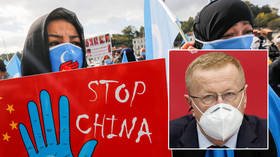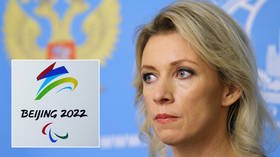What you need to know about the Beijing Winter Olympics boycotts
The Biden administration and the British government have announced boycotts of the Beijing Olympics. Russian President Vladimir Putin and French premier Emmanuel Macron say they are counter-productive. What are the arguments?
The decision by the US to confirm a diplomatic boycott of the Games, which take place in February, proved the most explosive flashpoint yet of an international row which has set countries against each other.
Some nations have followed Biden's lead, while others are vehemently opposed to the Senate's verdict.
How long has talk of an Olympics boycott been going on for?
Since at least March, when Utah Senator Mitt Romney earned a mixed reaction on social media for encouraging a boycott.
“China deserves our condemnation," Romney wrote in the New York Times. "The Chinese Communist Party has reneged on its agreement to allow Hong Kong self rule; it has brutally suppressed peaceful demonstrators and incarcerated respected journalists.
#BREAKING China says four Olympic diplomatic boycott nations will 'pay the price' pic.twitter.com/Vm9WU6hbEG
— AFP News Agency (@AFP) December 9, 2021
In April, a US State Department spokesman said a boycott was "something that we certainly wish to discuss” before appearing to backtrack, insisting that officials were "not discussing any joint boycott with allies and partners.”
Even at that early stage of the saga, China seemed to react strongly by vowing to respond to any action, which it called a "politicization" that it would not accept and which would "damage the spirit of the Olympic Charter and the interests of athletes from all countries."
A month later, US House Speaker Nancy Pelosi became embroiled in perhaps the fiercest row up to that point with China over a potential boycott.
Speaking at a congressional hearing, Pelosi implied that world leaders could not criticize any human rights violations if they did not perform a diplomatic boycott of the Games.
A Chinese foreign ministry official variously called Pelosi's remarks "full of lies and disinformation", accused the US of "using the Olympic movement to play despicable political games” and said their invalid complaints were a "pretext to smear and slander China”.
Which countries are boycotting the Winter Olympics in Beijing?
Since the US confirmed its boycott in December 2021, numerous other countries have followed suit.
Australian prime minister Scott Morrison said his country would not be sending officials to the Games, although China shot back by effectively claiming that no-one would care about that decision.
Canadian leader Justin Trudeau said his country had been "co-ordinating and discussing the issue with our allies" for months, and his Foreign Affairs Minister, Melanie Joly, admitted that she had initiated discussions on the issue in almost every meeting she had been involved in since starting her role in October.
Applaud PM Trudeau’s decision that Canada would join a diplomatic boycott of the Beijing Games. The CCP’s genocide of the Uyghurs is reprehensible & never again should a nation which so blatantly violates the human rights of its own citizens get the honor of hosting the Olympics. https://t.co/f8tcZ3qVSk
— Senator Mitt Romney (@SenatorRomney) December 9, 2021
In his weekly UK Prime Minister's Questions, Boris Johnson said his nation would observe "effectively a diplomatic boycott of the Winter Olympics in Beijing," adding: "No ministers are expected to attend."
Johnson was responding to the latest query in a succession of attempts by UK politicians to press him on the issue. He said he had discussed some of their concerns with his Chinese counterpart, Xi Jinping, on a regular basis.
Which countries aren't boycotting the Winter Olympics?
Despite Joly saying that she planned to raise the issue with France, the country's president, Emmanuel Macron, has said that he does not see the value in imposing a boycott on the Games.
A spokesman for the Iranian Foreign Ministry offered “solidarity” to China, accused the US of a “smear campaign”, shared images spreading the news of Johnson and Pelosi's views and said Iran is "looking forward to participation in the event."
Protestors gathered outside the Canadian Olympic Committee in Toronto to call for a full boycott of the Beijing Olympics on account of China's human rights violations.Footage by @PuffinsPicturespic.twitter.com/kVI6m9gfe9
— The Post Millennial (@TPostMillennial) December 12, 2021
Russia has consistently condemned the idea of a boycott. The Russian Olympic Committee said a boycott would violate the Olympic Charter, while president Vladimir Putin has reiterated that he believes it would be a negative step, denounced the politicization of sport and revealed that he expects to attend the opening ceremony as a guest of Xi.
While the Deputy Chairman of the European Parliament has called for an "all-out boycott", reports have suggested that there is little appetite among EU countries to join in.
Speaking on Wednesday, International Olympic Committee (IOC) President Thomas Bach said that a majority of governments from the 90 countries participating in the Games have decided to shun a diplomatic boycott.
Why are countries boycotting the Winter Olympics?
The nations participating in the diplomatic boycott accuse China of human rights abuses – the most heinous of which, they say, is the treatment of Uyghur Muslims in the north of the country.
China is allegedly holding around a million people captive in camps and subjecting them to forced labor, sterilization and other abuses, although Chinese leaders insist the facilities in the Xinjiang region are not used to mistreat anyone.
Amnesty International has called the alleged camps "draconian". As part of a 160-page report released in June, it claimed that Muslim minority men and women suffer "mass internment and torture", mass surveillance and are forced to abandon their religious traditions, cultural practices and local languages.
"We all know that the Chinese government denies basic human rights to China's minority religious communities," said Johnson, echoing the views of several other leaders.
One politician who questioned Johnson described the situation as "genocide", and the Tory leader called China's approach an "appalling campaign against the Uyghurs".
How has China responded to the boycotts?
China has consistenly responded emphatically and with counter-accusations, warning countries that they will “pay a price for their wrong moves".
"Sports have nothing to do with politics," said one spokesman, while China has also said that none of the nations carrying out boycotts had been invited to diplomatically attend the Games in any case.
LIVE: Free Tibet is at Piccadilly Circus alongside Tibetans, Uyghurs and Hong Kongers as we protest against the CCP and call on governments and athletes to boycott the Winter Olympics in February. #HumanRightsDaypic.twitter.com/Y4bmyTOEpk
— Free Tibet (@freetibetorg) December 10, 2021
The hosts have said that the participation of the athletes from the boycotting countries will make the Games a success, not the absence of their political representatives.
The Chinese Embassy in Canada perhaps summed up its country's response in the strongest terms, accusing the boycotters of "clinging to Cold War mentality and ideological prejudice".
"This is firmly opposed not only by the Chinese people, but also by all people that love peace and uphold justice in the world," it added.
















